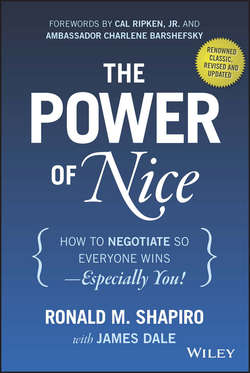Читать книгу The Power of Nice - Barshefsky Charlene - Страница 14
На сайте Литреса книга снята с продажи.
Chapter 1
Negotiation
What Negotiation Is
ОглавлениеKnowledge is power.
– Francis Bacon
If negotiation isn't laboratory science or a bloody war, if it isn't the macho drama portrayed in the movies, what is it?
Negotiation Is the Commerce of Information for Ultimate Gain
Let's take that definition apart. First, the commerce of information: Commerce is the business of trading. It's the stock market in New York, the commodities floor in Chicago, the street vendors in Tangiers. The difference here is that you're not exchanging corn futures for sowbellies or Moroccan francs for Persian rugs. You're trading what you know for what you need to know. In the negotiation market, information is the commodity. And in a negotiation, nothing is more valuable than information, whether it's two countries trying to make peace, two companies merging, two workers trading office gossip, or two kids swapping baseball cards. Is one veteran's card worth three up-and-comers? It all depends on information: What one kid wants and how bad. What the other kid has and is willing to give up.
Buzz
I'll give you a Ichiro Suzuki. What'll you give me?
Bob
I'll give you a Joe Mauer. But I won't give you my Derek Jeter.
Buzz
That's okay, my cousin's got a Derek Jeter – he'll trade me.
Bob
This one's in mint condition.
Buzz
Well, all I got is a whole mess of rookie cards.
Bob
Really? I got a rookie collection. Which ones you got?
Buzz
Let's see. I've got an Adam Jones and a Matt Wieters.
Bob
Not bad, but not enough for a mint Jeter.
Buzz
Okay, see ya.
Bob
You sure you don't have any others?
Buzz
Well, my little brother has this Mike Trout.
Bob
Too bad it's your brother's.
Buzz
He's only five and he says I can do whatever I want.
Bob
Really? Well, I have to think about it.
Buzz
I gotta go in for dinner.
Bob
Deal.
Kids swapping cards are no different from grown-up dealmakers. The commerce of information determines whether there can be a deal at all. Does one side have something of possible or real value to the other side, and vice versa? Do the sides want to make a deal or are they fishing? Is there competition? How deep are the buyer's pockets/resources? What are the terms of the deal? Who has decision-making power? Does either side have a deadline?
After feeling each other out with two players' cards either side would give up (fishing), Bob revealed he had the Derek Jeter card (possible value). Buzz wisely explained that he already could get a Jeter from his cousin (competition), which led to getting the information that Bob's Jeter card is in excellent condition (real value). Then, Buzz gave up information again, this time admitting he only had rookie cards (limited resources). Very smart move by Buzz. Either way, he learns. If Bob doesn't want rookies, there's nothing to talk about. But if he does, then there's plenty to talk about. It turns out Bob collects rookies (value for both sides). Buzz offers two rookies but Bob wants a third (terms of the deal). The third belongs to Buzz's brother, but Buzz can speak for his brother (decisionmaker). So now it's up to Bob to ponder whether it's a good deal. But Buzz has to go in for dinner (deadline).
Конец ознакомительного фрагмента. Купить книгу
